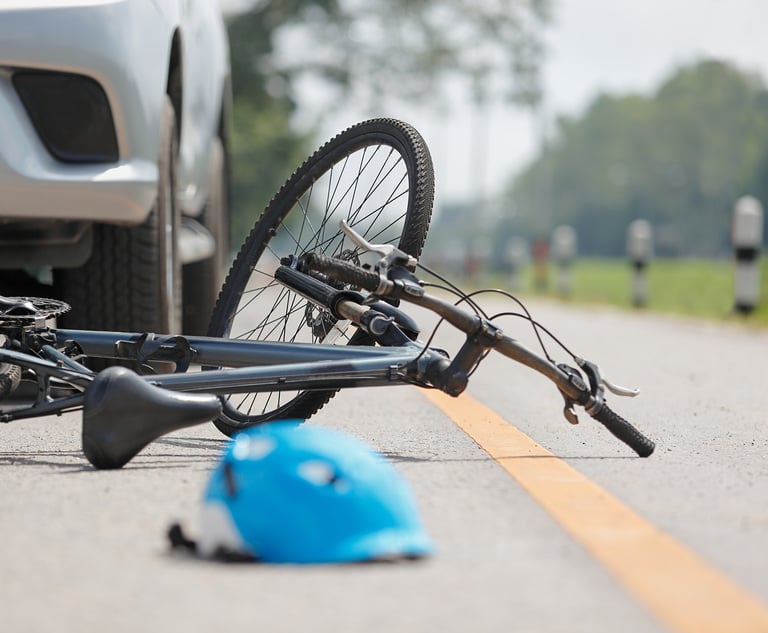Medical Providers' Negligence Led to Kidney Failure: Plaintiff
In May 2010, plaintiff Lacey Povrzenich, 14, underwent a kidney transplant after having been diagnosed with end-stage renal failure, in Pittsburgh.
December 20, 2018 at 02:48 PM
9 minute read
Povrzenich v. Ripepi
$4.24M Verdict
Date of Verdict: Oct. 26.
Court and Case No.: C.P. Washington No. 2015-4727; 2013-5772.
Judge: Katherine B. Emery.
Type of Action: Medical malpractice.
Injuries: Kidney failure.
Plaintiffs Counsel: Douglas L. Price, Harry S. Cohen & Associates, Pittsburgh.
Plaintiffs Experts: Tej K. Mattoo, pediatric nephrology, Detroit; Beth A. Logan, clinical psychology, Dover, Delaware; Dana Bissontz, life care planning; Pittsburgh; James L. Kenkel, economics; Pittsburgh; Steven G. Reichard, radiology; Newburgh, New York; Lawrence S. Newman, psychology/counseling, Pittsburgh.
Defense Counsel: Patrick S. Casey, Casey & Chapman, Wheeling, West Virginia; Terry C. Cavanaugh, Marshall Dennehey Warner Coleman & Goggin, Pittsburgh; Joseph N. Bongiovanni IV, Post & Schell, Philadelphia; Nicholas A. Cerimele, Rulis & Bochicchio, Pittsburgh; David R. Johnson, Burns White, Pittsburgh.
Defense Experts: Irwin Benuck, pediatrics; Evanston, Illinois; Arthur H. McTighe, pathology, Baltimore, Maryland; Randall D. Jenkins, pediatric nephrology; Boise, Idaho; Lawrence A. Cooperstein, radiology, Pittsburgh.
Comment:
In May 2010, plaintiff Lacey Povrzenich, 14, underwent a kidney transplant after having been diagnosed with end-stage renal failure, in Pittsburgh.
When Lacey was 18 months old, she began seeing pediatrician Dawn McCracken, and later pediatrician Jennifer Ripepi. Radiologist Frank Diettinger had interpreted a CT scan at one point; Lacey had seen physician's assistants at Mon Valley Community Health Services Inc.; and Monongahela Valley Hospital had interpreted her blood tests.
Lacey sued McCracken, Ripepi and her practice, Diettinger, Mon Valley Community Health Services and Monongahela Valley Hospital, alleging claims of medical malpractice against all parties.
From when Lacey was 18 months old to when she was 10 years old, she suffered repeated and recurrent urinary tract infections. During this time, Lacey was treated by McCracken, who prescribed antibiotics for her infections. From ages 4 to 8, Lacey had blood tests that showed abnormally high creatinine levels, markers for an abnormal kidney function, which allegedly went undetected.
When Lacey was 11, she moved and came under the care of pediatrician Ripepi for a period of six months. During that time, she had two urinary tract infections, which Ripepi attributed to dehydration and prescribed antibiotics. Lacey had been hospitalized for dehydration and vomiting. Lacey's lab work again showed high creatinine levels, which Ripepi allegedly ignored. In 2008, while under Ripepi's care, Lacey had an abdomen CT scan that was interpreted as normal by radiologist Diettinger.
In March 2009, after having moved again, Lacey, 13, began seeing a physician's assistant at Mon Valley Community Health Services. There were two abnormal blood-pressure readings that were allegedly abnormally high. In May 2010, a blood-pressure reading was again high, recorded as 183 over 124, which was missed by the physician's assistant.
Two weeks later, Lacey was taken to an emergency room after having difficulty urinating. She was initially diagnosed with dehydration, but after fluids failed to improve her condition, she was transferred to a children's hospital, where she was diagnosed with renal failure.
Lacey's expert in pediatric nephrology testified that Lacey's recurrent urinary tract infections were red flags that McCracken and Ripepi failed to heed and respond to accordingly. Having urinary tract infections at such a young age, and at such a frequency, should have caused the pediatricians to further investigate the situation, the expert maintained. The expert opined that McCracken and Ripepi should have correlated Lacey's abnormally high creatinine levels to kidney impairment or failure, and they improperly relied upon the incorrect blood readings by Monongahela Valley Hospital.
According to the expert, the hospital negligently based Lacey's lab results on adult values. Her values ranged from 0.9 to 1.8. A normal value for a child under 10 years old is 0.3 to 0.7; a normal adult value is 0.7 to 1.3. Most of Lacey's results were doubly normal for a child, yet Monongahela Valley Hospital posted the results as adult values, and also failed to communicate that these were adult values to Ripepi and McCracken, the expert determined.
Lacey's expert further faulted the physician's assistants at Mon Valley Community Health Services for failing to properly treat her bouts of hypertension, which she experienced when she had her blood pressure taken in March 2009 and 2010. According to the expert, if a 13- and 14-year-old has stage II hypertension, it should be interpreted as a critical vital sign; therefore, it must be investigated and cannot be written off or attributed to white coat syndrome/hypertension or some other innocuous reason.
According to Lacey's expert in radiology, her February 2008 CT scan showed findings suggesting kidney scarring and ureter problems. These two conditions indicated severe kidney damage that should have been detected, the expert opined.
McCracken admitted that she should have followed up on Lacey's high creatinine values. Her counsel argued that Lacey's kidney problems were congenital and that she would have needed a kidney transplant no matter what treatment would have been rendered.
Ripepi's counsel contended that the evidence did not show that Ripepi ignored high creatinine levels in 2008; rather the doctor considered these to be consistent with her diagnosis of a kidney infection that resulted in Lacey's hospitalization in 2008. To be sure that there was not a kidney issue, Ripepi ordered an ultrasound. It was negative for any problems, and thereby consistent with the CT scan read by Diettinger.
Ripepi's counsel argued that the pediatrician's care of Lacey also met good and acceptable standards.
Ripepi's expert in pediatrics explained that Ripepi met the standard of care because she addressed the high creatinine levels with a diagnosis of pyelonephritis, a form of kidney infarction. Furthermore, she confirmed that there was no problem with an ultrasound. Ripepi had a follow-up visit with the plaintiff in which Lacey's condition had returned to normal; and then, on the next visit, she advised her mother that if problems persisted, Lacey should have a urology consult. According to the expert, Lacey's mother did not bring her back to Ripepi and never secured a consult. Lacey's mother disputed that Ripepi had told her about getting a consult.
Monongahela Valley Hospital's counsel argued that the hospital was a small community hospital that did not have the requirement to report individual ages of patients' blood tests; instead, it reports on the majority of the area's population, which is primarily comprised of adults. Its expert in pathology testified that the hospital's lab reporting was proper for a small community hospital like Monongahela Valley Hospital, and within the standard of care. The expert determined that the hospital did not have to provide lab reports for children, and that it was the responsibility of Lacey's pediatricians to note that.
Mon Valley Community Health Services' counsel asserted that Lacey's March 2009 blood pressure was not that abnormal, and was most likely the result of her being sick with an earache at the time and experiencing fear of the doctor's office, otherwise known as white coat syndrome/hypertension. Moreover, repeated abnormal blood pressures are not indicative of kidney failure, the defense argued. As to the May 2010 visit, the physician's assistant testified that he did not remember the exam with Lacey.
Diettinger's expert in radiology testified that the 2008 CT scan showed no evidence of kidney scarring and ureter problems. Additionally, an ultrasound that had been taken at the same time did not show any kidney damage; in fact, it demonstrated good kidney function, and any dysfunction would have been detected by the ultrasound, the expert opined.
Lacey's expert in radiology maintained ultrasounds do not always detect kidney scarring like a CT scan.
Lacey's mother donated her kidney to her daughter, since both of Lacey's kidneys were damaged, with her right kidney more injured. She then underwent six months of dialysis. Lacey came under the care of a nephrologist, whom she continued to see at the time of trial. Additionally, she continued to have urinary tract infections. In 2014 and 2015, Lacey underwent ureterectomies to bypass her ureters in order to provide relief for her kidneys. Also in 2015, Lacey had her two kidneys removed after they had reached the point of irrevocable damage. At the time of trial, Lacey continued to see her physicians every three months and take 30 medications per day. She sought to recover a medical lien of $242,573.
Lacey's expert in pediatric nephrology testified that she will most likely need a future kidney transplant. Her current kidney function is hovering around 30 percent, which is sufficient, but if her function decreases below 20 percent, she will need a transplant, the expert opined.
Lacey further treated with psychological counseling after being diagnosed with anxiety. Due to having a third kidney, which was placed in her abdomen, Lacey had a protrusion in her abdomen that caused her peers at school to make fun of her and bully her. In 2013, Lacey stopped taking her kidney medication in a veiled attempt to commit suicide. Lacey's psychologists discussed the emotional distress that she sustained, and related it to the bullying in school.
Ripepi's expert in pediatric nephrology testified that by the age of 8 months old, Lacey's lab values reflected that she had been born with kidney problems, and that by age 4, at least, she was destined for kidney failure and a transplant. The expert testified that by the time Ripepi saw Lacey, there was no way she could ever have reversed or changed her course. The expert further noted that the fact that Lacey continues to have urinary tract infections demonstrates that Lacey was congenitally predisposed to kidney problems.
The jury found McCracken 85 percent liable and Mon Valley Community Health Services 15 percent liable. No liability was found against Ripepi, her practice, Diettinger and Monongahela Valley Hospital. Lacey was determined to receive $4,242,573.
Mon Valley Community Health Services has filed a motion seeking judgment notwithstanding the verdict, or in the alternative a new trial as to all issues. Plaintiffs counsel has filed a motion for a new trial as to damages.
This report is based on information that was provided by plaintiffs counsel and counsel of Monongahela Valley Hospital, Ripepi and Jennifer K. Ripepi Pediatrics. The remaining defendants' counsel did not respond to calls for comment.
—This report first appeared in VerdictSearch, an ALM publication
This content has been archived. It is available through our partners, LexisNexis® and Bloomberg Law.
To view this content, please continue to their sites.
Not a Lexis Subscriber?
Subscribe Now
Not a Bloomberg Law Subscriber?
Subscribe Now
NOT FOR REPRINT
© 2025 ALM Global, LLC, All Rights Reserved. Request academic re-use from www.copyright.com. All other uses, submit a request to [email protected]. For more information visit Asset & Logo Licensing.
You Might Like
View All
Patent Pending ... and Pending ... and Pending? Brace Yourself for Longer Waits
3 minute read
Boosting Litigation and Employee Benefits Practices, Two Am Law 100 Firms Grow in Pittsburgh
3 minute read
Harrisburg Jury Hands Up $1.5M Verdict to Teen Struck by Underinsured Driver
3 minute read
De-Mystifying the Ethics of the Attorney Transition Process, Part 2
Trending Stories
- 1Public Notices/Calendars
- 2Wednesday Newspaper
- 3Decision of the Day: Qui Tam Relators Do Not Plausibly Claim Firm Avoided Tax Obligations Through Visa Applications, Circuit Finds
- 4Judicial Ethics Opinion 24-116
- 5Big Law Firms Sheppard Mullin, Morgan Lewis and Baker Botts Add Partners in Houston
Who Got The Work
J. Brugh Lower of Gibbons has entered an appearance for industrial equipment supplier Devco Corporation in a pending trademark infringement lawsuit. The suit, accusing the defendant of selling knock-off Graco products, was filed Dec. 18 in New Jersey District Court by Rivkin Radler on behalf of Graco Inc. and Graco Minnesota. The case, assigned to U.S. District Judge Zahid N. Quraishi, is 3:24-cv-11294, Graco Inc. et al v. Devco Corporation.
Who Got The Work
Rebecca Maller-Stein and Kent A. Yalowitz of Arnold & Porter Kaye Scholer have entered their appearances for Hanaco Venture Capital and its executives, Lior Prosor and David Frankel, in a pending securities lawsuit. The action, filed on Dec. 24 in New York Southern District Court by Zell, Aron & Co. on behalf of Goldeneye Advisors, accuses the defendants of negligently and fraudulently managing the plaintiff's $1 million investment. The case, assigned to U.S. District Judge Vernon S. Broderick, is 1:24-cv-09918, Goldeneye Advisors, LLC v. Hanaco Venture Capital, Ltd. et al.
Who Got The Work
Attorneys from A&O Shearman has stepped in as defense counsel for Toronto-Dominion Bank and other defendants in a pending securities class action. The suit, filed Dec. 11 in New York Southern District Court by Bleichmar Fonti & Auld, accuses the defendants of concealing the bank's 'pervasive' deficiencies in regards to its compliance with the Bank Secrecy Act and the quality of its anti-money laundering controls. The case, assigned to U.S. District Judge Arun Subramanian, is 1:24-cv-09445, Gonzalez v. The Toronto-Dominion Bank et al.
Who Got The Work
Crown Castle International, a Pennsylvania company providing shared communications infrastructure, has turned to Luke D. Wolf of Gordon Rees Scully Mansukhani to fend off a pending breach-of-contract lawsuit. The court action, filed Nov. 25 in Michigan Eastern District Court by Hooper Hathaway PC on behalf of The Town Residences LLC, accuses Crown Castle of failing to transfer approximately $30,000 in utility payments from T-Mobile in breach of a roof-top lease and assignment agreement. The case, assigned to U.S. District Judge Susan K. Declercq, is 2:24-cv-13131, The Town Residences LLC v. T-Mobile US, Inc. et al.
Who Got The Work
Wilfred P. Coronato and Daniel M. Schwartz of McCarter & English have stepped in as defense counsel to Electrolux Home Products Inc. in a pending product liability lawsuit. The court action, filed Nov. 26 in New York Eastern District Court by Poulos Lopiccolo PC and Nagel Rice LLP on behalf of David Stern, alleges that the defendant's refrigerators’ drawers and shelving repeatedly break and fall apart within months after purchase. The case, assigned to U.S. District Judge Joan M. Azrack, is 2:24-cv-08204, Stern v. Electrolux Home Products, Inc.
Featured Firms
Law Offices of Gary Martin Hays & Associates, P.C.
(470) 294-1674
Law Offices of Mark E. Salomone
(857) 444-6468
Smith & Hassler
(713) 739-1250






